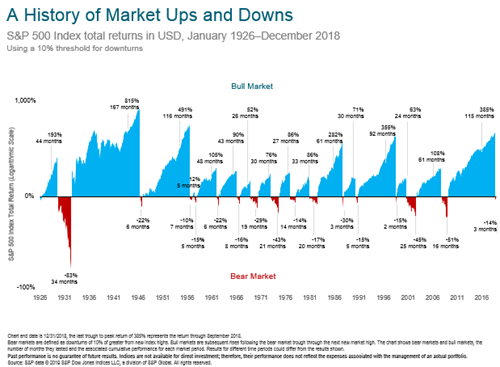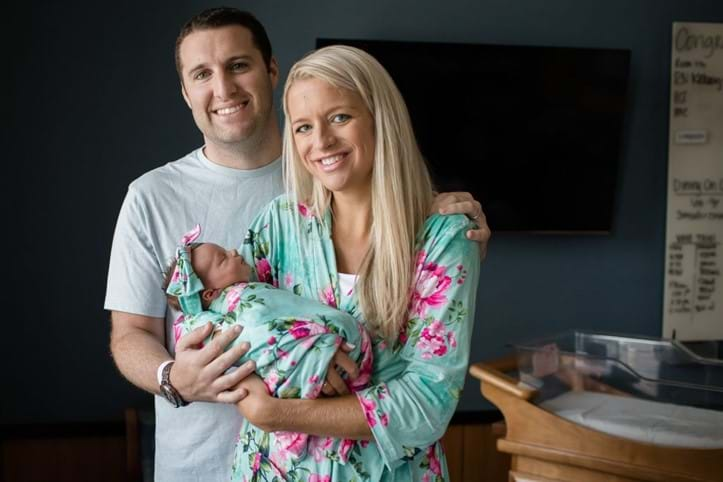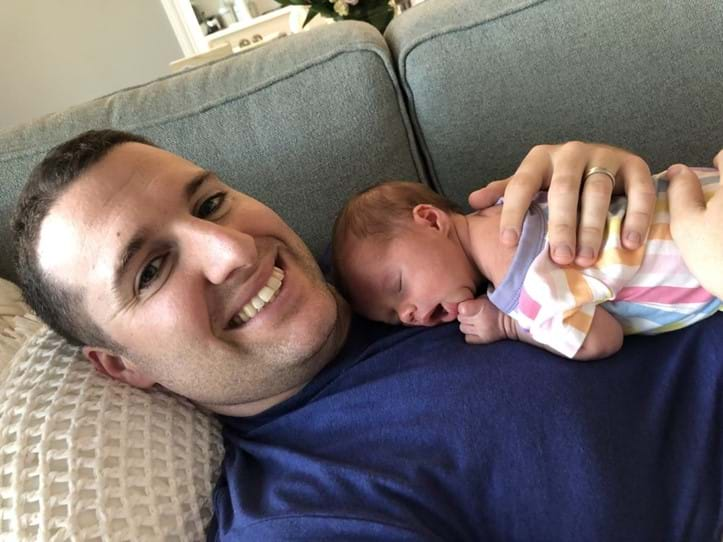Investing Lessons from Three Weeks of Fatherhood
I scheduled this post to drop at 2:42 AM on August 15th, 2019. At that very moment, I will have been a Dad for exactly three weeks. In spite of the requisite sleep deprivation, there is no question that these have been the most incredible and joyous three weeks of my life. Going back to work on Monday and leaving my little Hannah for the day was WAY harder than I ever could have imagined.
In the few weeks I was out of the office, I did my best to truly “unplug” and savor every moment with my new daughter. That said, I am an investment blogger and as investment bloggers tend to do, we (sometimes inadvertently) seek out ways to draw parallels between markets and everyday life. With that in mind, I wanted to share some lessons that apply to both parenting and portfolios.
(I promise if you stick around ’til the end of the post you will be rewarded with cute baby pictures 🙂)
Time Dilation is Real
In the book Efficiently Inefficient, AQR’s Cliff Asness is quoted as saying (emphasis mine):
Well the single biggest difference between the real world and academia is — this sounds overly scientific — time dilation. I’ll explain what I mean. This is not relativistic time dilation as the only time I move at speeds near light is when there is pizza involved. But to borrow the term, your sense of time does change when you are running real money. Suppose you look at a cumulative return of a strategy with a Sharpe ration of 0.7 and see a three year period with poor performance. It does not phase you one drop. You go: “Oh, look, that happened in 1973, but it came back by 1976, and that’s what a 0.7 Sharpe ratio does.” But living through those periods takes — subjectively, and in wear and tear on your internal organs — many times the actual time it really lasts. If you have a three year period where something doesn’t work, it ages you a decade. You face an immense pressure to change your models, you have bosses and clients who lose faith, and I cannot explain the amount of discipline you need.
As most new parents experience early on, the days are short and the nights are long. Bull and Bear markets can be similar. In Bull markets, the stock market can triple in a decade and we barely notice as its happening. Then eventually a Bear market comes along, time comes to a screeching halt, and every day feels like an eternity with no end in sight.
Correlation is Not Causation
The first time we found ourselves struggling to get Hannah down for a nap, we decided to download a white noise app to our phones. Almost instantaneously, it worked. And then it stopped working – or at least stopped working as well. Then my sister recommended turning the kitchen faucet on. That too experienced almost immediate alpha decay. In both cases, we immediately drew the conclusion that it was *because* we were doing these things that she was falling asleep. As opposed to, you know, the fact that she’s a baby and babies sleep a lot. It reminds me a bit of the old chestnut about butter production in Bangladesh explaining the returns of the S&P 500…
Things Change Quickly
One minute they’re sleeping peacefully, the next minute they are crying hysterically. A baby’s state of being can turn on a dime. So can the stock market.
Last December, the S&P 500 dropped nearly 20 percent. On Christmas Eve, we all felt like the next big one had arrived. And then things changed and it was off to the races as the stock market marched higher for almost all of 2019, at one point gaining over 20 percent. And now here we are today, staring at perhaps another correction. We will only know in hindsight whether this is something material or just another blip on the radar. That is why an emphasis on preparation over prediction is so crucial.
The Value of Advice
That moment you arrive home after leaving the hospital is exciting and terrifying all at once. On one hand, you’re out of the uncomfortable hospital beds and back on your home turf. On the other hand, you are now without the professional help and guidance from nurses and doctors that made those first few days go as smoothly as possible.
For first-time parents, that initial night at home is uncharted territory. We oversrutinize every noise the baby makes. We worry that we don’t know what the heck we’re doing. Eventually you figure it out, but not without the sage counsel of family and friends that have been around the block before.
For many people, investing is unfamiliar and intimidating terrain. Having a trusted advisor that can help make sense of everything and keep the ship steady during turbulent times can be invaluable.
Diversification is Your Friend
Teamwork makes the dream work. I’m not sure what my wife and I would have done without the support of each other and our loved ones. We each bring our own strengths and weaknesses to the table, but there is no doubt that our collective togetherness in this journey far surpasses our individual efforts.
You can’t rely on one security or one asset class to do all the heavy lifting in your portfolio and expect to achieve your financial goals. You need things that are complementary to each other, that can zig when the other zags, and that can support each other during periods of stress.
There’s More Than One Way to Skin Swaddle a Cat Baby
The first night in the hospital after the delivery, the nurse showed me how to properly swaddle the baby. The next morning, a new nurse came in and showed me a different method. The following week, at the pediatrician’s office, the Doctor showed me – you guessed it – a third way of swaddling! They all had one thing in common: they kept Hannah warm and secure.
Investing is similar in that there are many styles, strategies and techniques that “work” over time. What matters the most is finding what works for you. I took pieces of each swaddling method I was shown and I now have my own unique twist. It might not be what the nurse would do, but it works for me (and Hannah.)
Forecasting is Hard
It’s hard to think of a better example of a complex adaptive system than financial markets, but a newborn baby might just be one of them. And complex adaptive systems are inherently unpredictable – particularly in the short-term.
The Good Far Outweighs the Bad
Newborns come with their own challenges, but I have no doubt that when Hannah is a toddler, there will be moments when I hearken back to the halcyon days of her being a baby. And when she is in middle school, I’ll yearn for the toddler days. And on and on it will go. Every stage of her life will come with its own unique challenges. But those will all pale in comparison to the benefits of being her Dad and watching her grow up over time.
The history of markets is filled with good times and bad, as evidenced below.

Source: Dimensional Fund Advisors
Although the bad times can exceed our expectations in duration and magnitude, they don’t last forever. And the good times dwarf the bad and allow us to grow and compound our wealth.
You don’t regret having a child, in spite of the moments that test your patience and resolve. And you don’t regret being a disciplined investor after thirty years, despite the hiccups and walls or worry that inevitably pop up along the way.
The exercises of investing and parenting are in reality worlds apart. But what they do share in common is that they are both done in earnest to improve expected future outcomes for the people you love. And while neither is easy, nothing worthwhile ever is.
And now, cuteness:







Get on the List!
Sign up to receive the latest insights from Phil Huber directly to your inbox.

